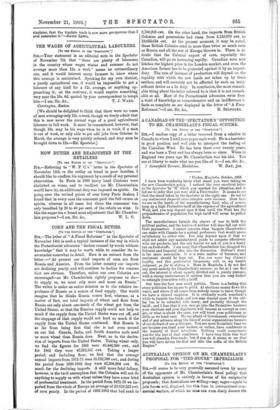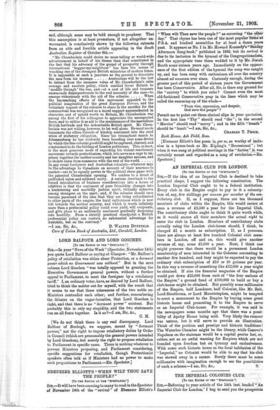AUSTRALIAN OPINION ON MR. CHAMBERLAIN'S PROPOSAL FOR "TIED-HOUSE" IMPERIALISM. [To
THE EDITOR OP THE "SpitorAxoal Snt,—It seems to be very generally assumed (even by many of the opponents of Mr. Chamberlain's fiscal policy) that Australian opinion is entirely in favour of his reciprocity proposals ; that Australians are willing—nay, eager—again to join forces with England, but this time in international com- mercial warfare, of which no man can even dimly discern the
end, although some may be bold enough to prophesy. That this assumption is at least premature, if not altogether un-
warranted, is conclusively shown by the following extracts from an able and forcible article appearing in the South Australian Register of October 8th :— " Mr. Chamberlain could desire no more telling or world-wide advertisement in behalf of his theme than that constituted in the fact that his advocacy of the gospel of prosperity through international beggar-my-neiolbour ' has been the means of wrecking one of the strongest British ministries of modern times. It is impossible at such a juncture as the present to dissociate
the man from his message Australians will be the last to detract from the immense value of Mr. Chamberlain's calm courage and resolute policy, which enabled Great Britain to muddle through' the war, and—at a cost of life and treasure enormously disproportionate to the real necessity of the case—to emerge victoriously with the aid of the colonies When the far-reaching effects of this movement appealed to the political imagination of the great European Powers, and the voluntary request of the colonies to share in the sacrifice for the commonweal was recognised as a moral support unprecedented in character, and of untold worth to Britain, Mr. Chamberlain was among the first of his colleagues to appreciate the unsuspected force, and to utilize it as aid to the maintenance of the marvellous British fortitude and the indomitable British spirit. Mr. Cham- berlain was not willing, however, to let well alone. He must needs transmute the silken threads of kinship sentiment into the steel wires of statutory obligation. Since his triumphant march to JobaXmesburg he has evidently been brooding over some device by which the free colonial goodwill might be captured, chained, and constrained to do the bidding of London politicians. This, at least, is the most generous mode of regarding his violent reactionary movement towards protectionism, which is to serve as a cage to im- prison together the mother country and her daughter nations, and
to isolate them from commerce with the rest of the world In any event foreigners and Australian colonists—whatever may be the advantage to Canadians on account of their nearness to market—are to be equally pawns in the political chess game with the patented Chamberlain opening. We confess to a dread of padlocked union and soldered amity. A serious drawback to the forced introduction of business considerations into a house of relatives is that the sentiment of pure friendship changes into a huckstering and morbidly jealous spirit, virtually unknown among strangers on the mart; and, if the colonies should once become possessed of the idea that they are being subordinated to other parts of the empire, the loyal entlitniasin which is now felt towards the mother country, and which is worth infinitely more than a preferential policy could ever yield, will evaporate, and give place to an unfriendly sentiment gradually deepening into hostility. From a strictly practical standpoint a British preferential policy can contain no substantial advantage for Australia, but on the contrary."
—I am, Sir, &c., D. WALTER DITITIELD. Care of Union Bank of Australia, Ltd., Cornhill, London.



























































 Previous page
Previous page